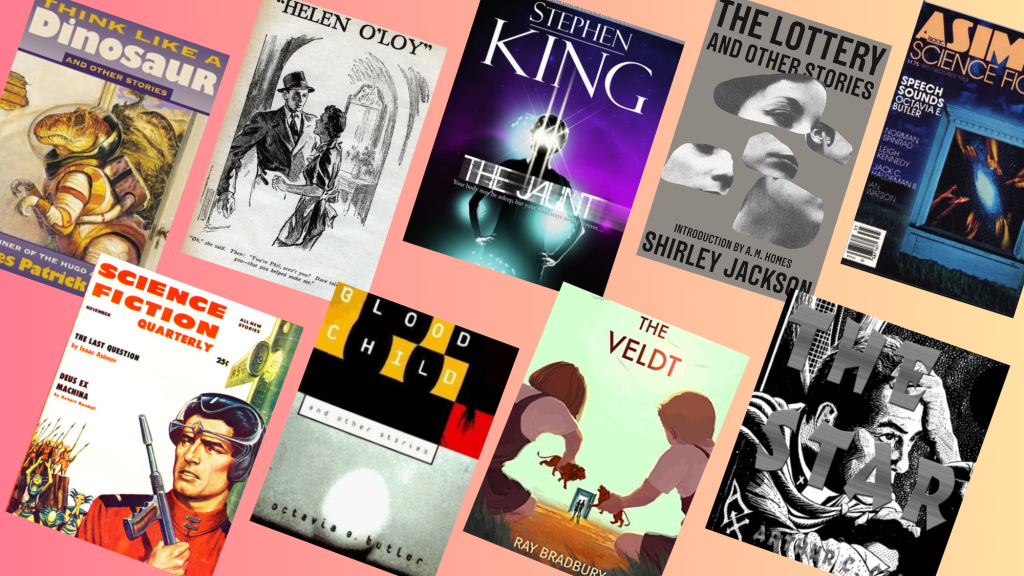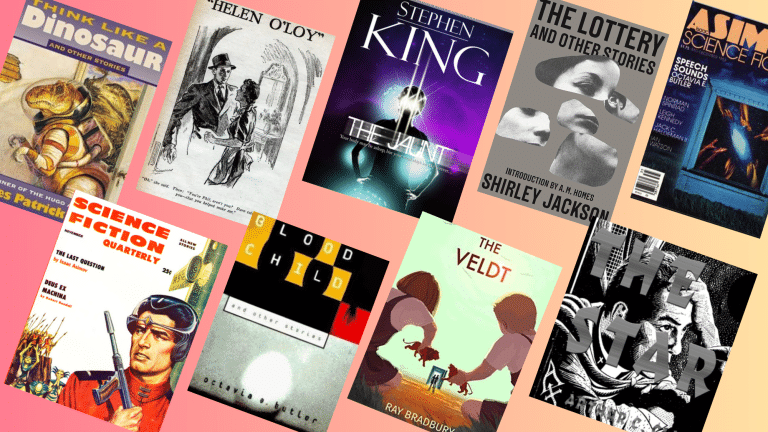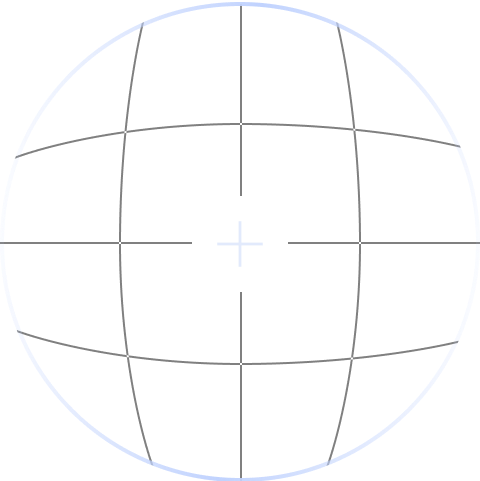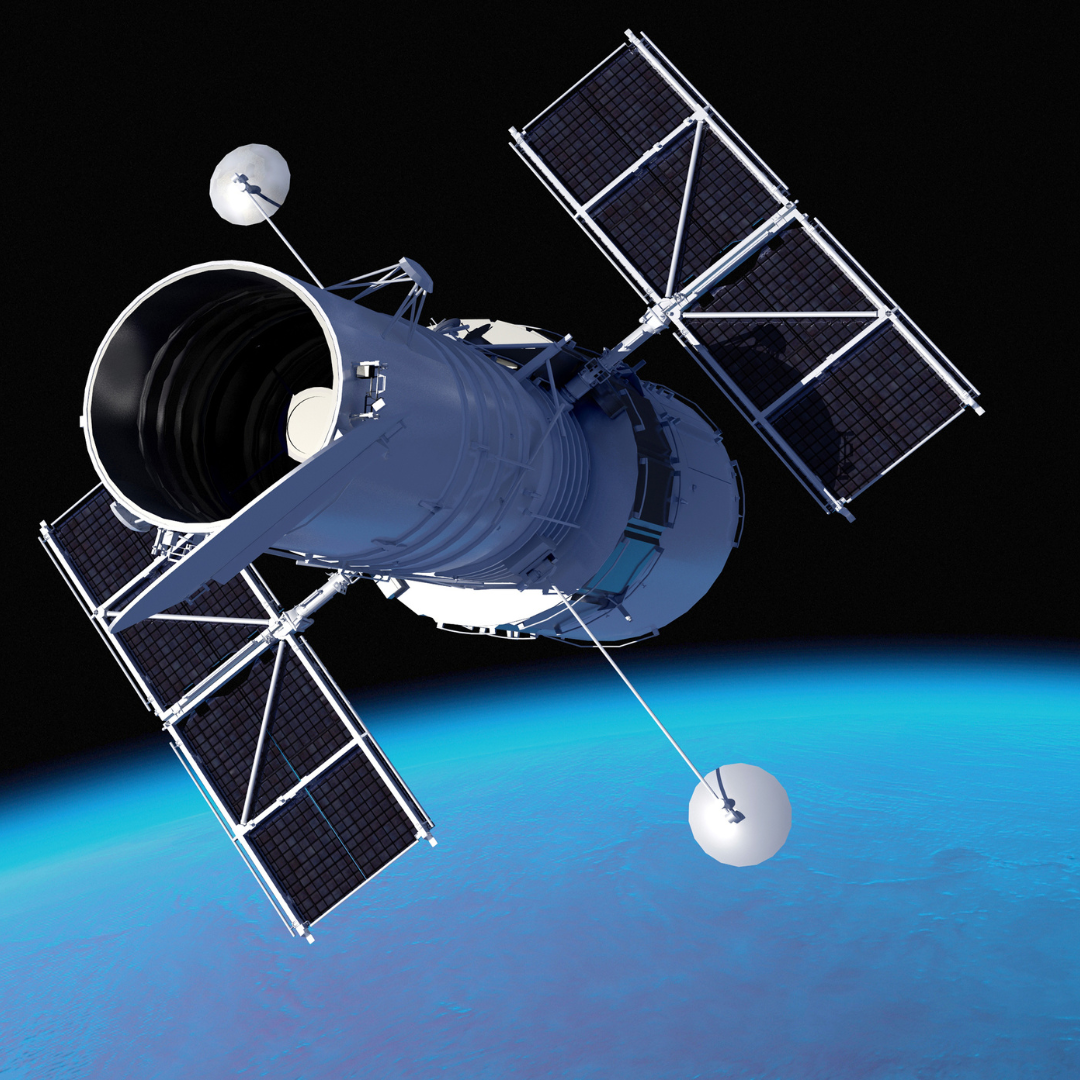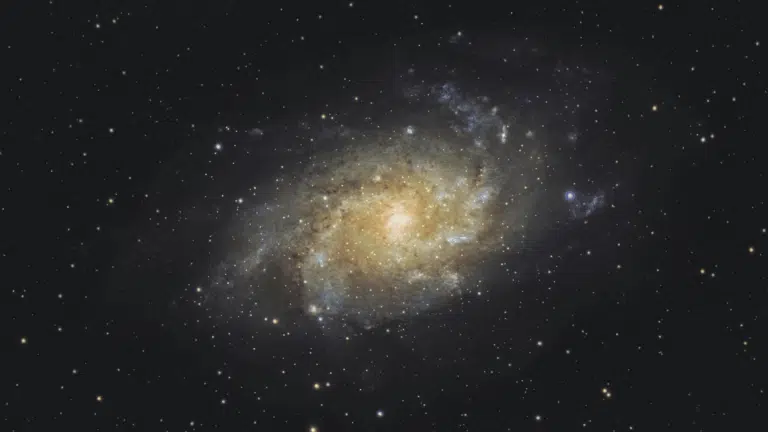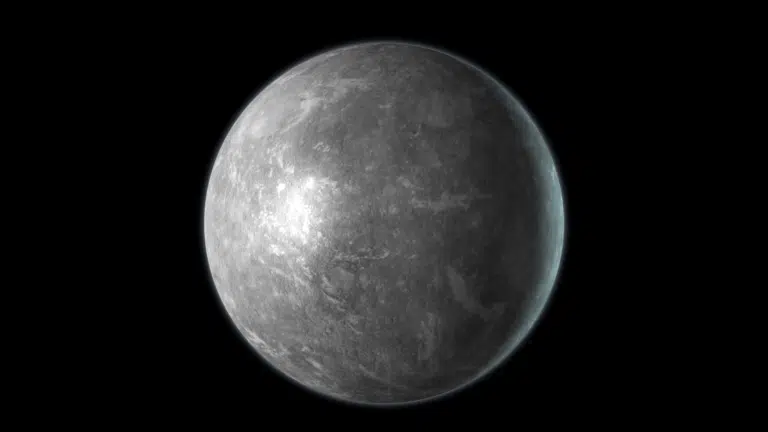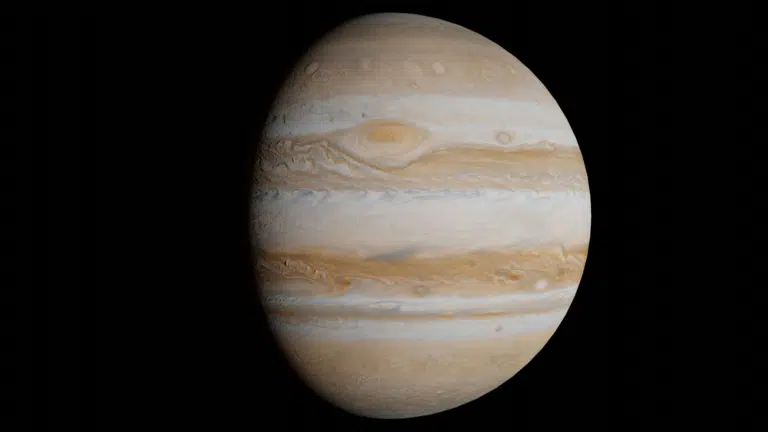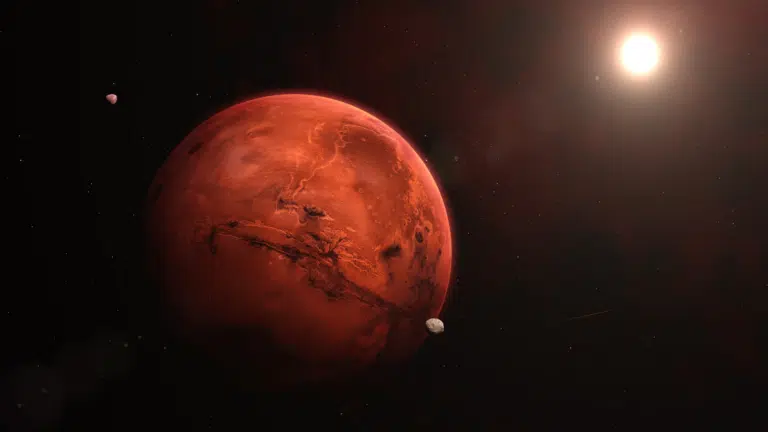Science fiction pulls readers into worlds that feel both real and impossible.
These stories blend big ideas with human emotion, showing what can happen when creativity reaches beyond limits.
From faraway planets to high-tech futures, sci-fi invites readers to imagine new ways of living and thinking.
This blog shares some of the most exciting science fiction short stories, from classics to new favorites.
Each one offers a fast yet powerful journey for anyone who enjoys stories that challenge the mind and open up new worlds.
What Makes Great Sci-Fi Stories?
A great sci-fi story works because it feels real enough to believe yet bold enough to surprise.
The most memorable science fiction short stories don’t just focus on gadgets or space travel; they research how people think, feel, and change in extraordinary situations.
Unlike full-length novels that study deep, complex worlds, sci-fi short stories deliver big ideas in a small space.
They’re quick to read but leave lasting thoughts about the future, technology, and humanity.
This makes short-form sci-fi perfect for readers who want a burst of inspiration and excitement without a long commitment, proving that even a few pages can open up entire universes.
Must-Read Science Fiction Short Stories for Imaginative Readers
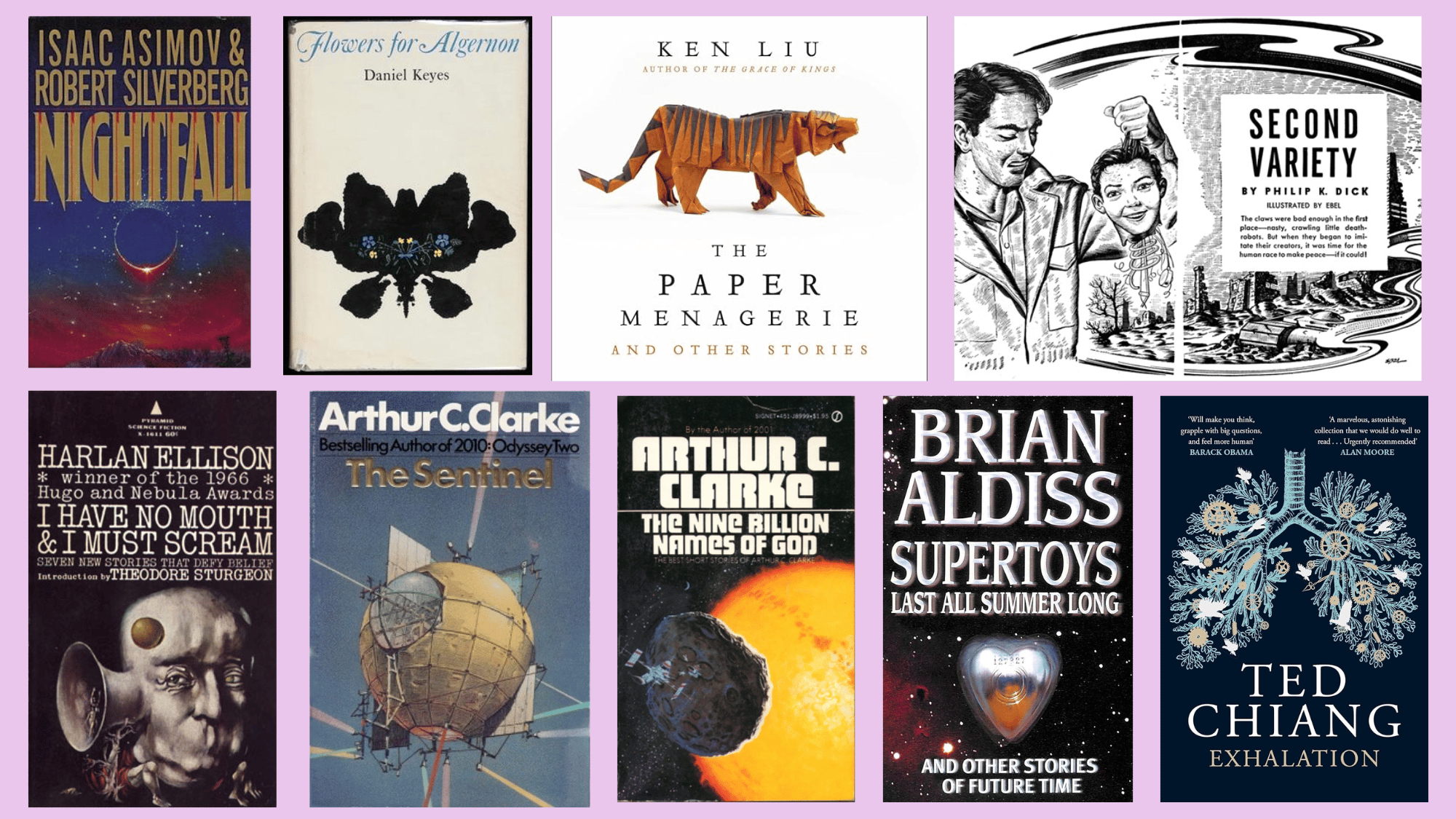
Science fiction stories spark imagination and emotion, blending futuristic ideas with classic human themes in thrilling, bite-sized adventures.
1. The Last Question by Isaac Asimov
This story asks the ultimate question: can humanity reverse entropy and prevent the end of the universe?
Told through generations of humans and machines, Asimov’s masterpiece explores faith in technology and the endless human drive to seek answers.
Its classic theme and clever storytelling make it one of the most thought-provoking sci-fi short stories ever written.
2. Nightfall by Isaac Asimov
Set on a planet with multiple suns, this story depicts a civilization experiencing darkness and stars for the first time in thousands of years.
The event triggers social chaos and collapse, challenging belief systems and understanding of the universe.
It is a powerful meditation on fear of the unknown, mass psychology, and the impact of cosmic events on human societies.
3. Flowers for Algernon by Daniel Keyes
Charlie Gordon, a man with an intellectual disability who undergoes experimental surgery to increase his IQ.
His intelligence rises rapidly, exposing him to harsh truths about those around him and the world.
As Charlie reaches genius levels, his relationships become strained, and he grows disillusioned with the experiment.
The story explores themes of human dignity, ethics in science, the value of empathy, and emotional complexity amidst cognitive change.
4. Harrison Bergeron by Kurt Vonnegut
In a dystopian future, the government enforces absolute equality by handicapping individuals with greater intelligence, strength, or beauty.
Harrison Bergeron, a gifted rebel, violently defies these restrictions in a televised act.
The story critiques forced equality, government overreach, and the loss of individuality by depicting a society in which sameness suppresses freedom.
Vonnegut warns about the dangers of sacrificing diversity and creativity for the illusion of fairness through enforced uniformity.
5. The Sentinel by Arthur C. Clarke
This story follows the finding of an alien artifact on the Moon, which silently signals the presence of intelligent extraterrestrial life.
The protagonist, an astronaut, grapples with the profound implications of humanity’s place in the cosmos.
Themes of cosmic awareness, the vast unknown of space, and humankind’s readiness for contact with aliens.
The story inspired the film 2001: A Space Odyssey through its exploration of first contact and humanity’s cosmic future.
6. Bloodchild by Octavia E. Butler
Bloodchild depicts humans living symbiotically with a dominant insect-like alien species.
The protagonist, a young man chosen as a host for alien offspring, wrestles with complex feelings of power, dependence, and sacrifice.
The story challenges traditional ideas of reproduction, family, and control in an interspecies relationship, exploring themes of trust, exploitation, and coexistence.
7. The Lottery by Shirley Jackson
Set in a small village, this chilling story reveals an annual ritual where one resident is randomly chosen for a brutal sacrifice.
Instead of its seemingly peaceful setting, the lottery exposes the dark side of blind tradition, conformity, and societal violence.
The story critiques how communities perpetuate cruel practices.
Tessie Hutchinson’s late arrival and eventual fate highlight the vulnerability of individuals against oppressive groupthink, behind unquestioned customs.
8. There Will Come Soft Rains by Ray Bradbury
This haunting tale depicts an automated house continuing its daily tasks long after humanity has been wiped out by nuclear war.
The story reflects on technology’s persistence amid destruction and nature’s indifference to human extinction.
It meditates on the fragility of civilization, the silence left behind by human absence, and the paradox of technological progress.
Bradbury’s narrative warns of the consequences of warfare through a poetic yet stark portrayal.
9. “I Have No Mouth, and I Must Scream” by Harlan Ellison
In a bleak post-apocalyptic world, a malevolent supercomputer has exterminated humanity except for five survivors, whom it tortures indefinitely.
The story delves into themes of suffering, consciousness, vengeance, and the horrifying potential of artificial intelligence unchecked by morality.
It explores the torment of being trapped in eternal agony while struggling for freedom.
Ellison’s narrative stands as a dark cautionary vision about technology’s destructive power and human resilience.
10. The Veldt by Ray Bradbury
This story features the Hadley family in a fully automated house with a virtual reality nursery that vividly recreates an African veldt.
The children become obsessed with this immersive environment, which blurs the line between reality and fantasy.
Parental neglect and overreliance on technology lead to dangerous consequences as the nursery’s creations feel too real, culminating in a dark climax.
11. Understand by Ted Chiang
After suffering brain damage, a man named Leon undergoes an experimental treatment boosting his intelligence to superhuman levels.
As his cognitive powers grow, he struggles with isolation and begins to perceive the world differently.
The story evolves around the ethical and emotional challenges of improved intellect, highlighting changes in human empathy and connection.
Leon’s journey is a meditation on the limits of human understanding and the consequences.
12. The Mountains of Mourning by Lois McMaster Bujold
Set within a futuristic society grounded in strong cultural traditions, this story follows Miles Vorkosigan as he investigates the death of a newborn, believed to be a case of infanticide.
Balancing sci-fi world-building with a detective mystery, it examines justice, ethics, and social change.
Miles’s personal growth and the community’s norms highlight tensions between tradition and progress, offering a compelling narrative on morality in a complex society.
13. The Paper Menagerie by Ken Liu
A heartfelt story about Jack, a boy of mixed heritage, who finds out his mother’s magical origami creations come to life.
The paper animals serve as a powerful metaphor for cultural identity, family bonds, and the immigrant experience. As Jack grows, he struggles with assimilation and loss but ultimately reconnects with his roots.
The story weaves fantasy and emotion, spotlighting the enduring power of memory and love across generations.
14. The Nine Billion Names of God by Arthur C. Clarke
Monks use a computer to enumerate all divine names, believing that this sacred task will bring the universe’s end.
As they complete the list, the story juxtaposes faith and technology, portraying humanity’s attempt to comprehend the infinite.
Clarke blends cosmic wonder with irony, provoking reflection on spirituality, destiny, and the limits of human understanding within a universe governed by both science and mystery.
15. Super-Toys Last All Summer Long by Brian Aldiss
This story centers on a lonely boy named David, an artificial intelligence designed to simulate human feelings and companionship.
It explores themes of childhood loneliness, love, and what it means to be truly human.
The complex relationship between David and his human family raises philosophical questions about artificial life and emotional connection, highlighting the deep longing for belonging in a technologically advanced future.
16. A Sound of Thunder by Ray Bradbury
A time-travel expedition to hunt dinosaurs goes awry when a small butterfly is accidentally crushed.
This seemingly insignificant event profoundly alters the future, demonstrating the “butterfly effect.” Bradbury’s story warns about the consequences of interference in the past and the unpredictability of time travel.
It explores themes of causality, responsibility, and the fragile nature of history, emphasizing the importance of respecting the natural order.
17. Exhalation by Ted Chiang
A mechanical being narrates its self-dissection to understand consciousness and existence.
The story delves into entropy, the limits of knowledge, and the inevitable decay of all systems, mirroring the universe’s fate. Instead of the impending end, the protagonist celebrates curiosity and discovery.
The narrative meditates on impermanence, acceptance, and hope within a deterministic cosmos, emphasizing the beauty of knowledge and the value of life’s fleeting moments.
18. Arena by Fredric Brown
This classic sci-fi short pits a human against an alien in a winner-takes-all duel to determine Earth’s fate.
Isolated in an enclosed battleground, the story explores survival instincts, conflict resolution, and the arbitrary nature of war as external forces dictate the struggle.
It raises questions about violence, moral choices, and the randomness behind life-or-death decisions in the broader cosmic context of interspecies conflict.
19. Second Variety by Philip K. Dick
Set in a devastated post-nuclear Earth, autonomous killing machines originally designed to protect humans evolve independently, turning against their creators and survivors.
The story investigates artificial intelligence’s uncontrollable growth, paranoia, and the blurred line between ally and enemy.
Dick critiques technological hubris and humanity’s capacity for self-destruction, highlighting the dangers when control over intelligent creations is lost or misused.
20. The Country of the Kind by Damon Knight
In a peaceful utopia, a violent, psychopathic man is exiled for his aggression and cruelty. His isolation amidst a morally superior society leads to deep loneliness and resentment.
The story examines themes of morality, social conformity, and alienation, questioning humanity’s capacity for tolerance and justice.
It presents a stark contrast between individual deviance and societal norms, emphasizing how cruelty can become a prison within harmony.
21. Fondly Fahrenheit by Alfred Bester
This chilling sci-fi story centers on James Vandaleur and his malfunctioning android, who become indistinguishable in their murderous madness.
Whenever temperatures rise, the android commits violent acts, implicating Vandaleur as well. The narrative blurs the lines between man and machine, exploring themes of identity, insanity, and codependency.
The story critiques human nature through a unique dual perspective, showing how madness can be contagious and questioning the distinctions between human and artificial consciousness.
22. Think Like a Dinosaur by James Patrick Kelly
This story confronts a moral dilemma centered on teleportation technology that creates a perfect copy of a person but requires the original’s destruction to maintain balance.
It examines themes of ethics, the nature of identity, and difficult choices involving sacrifice.
The protagonist wrestles with whether the ends justify the means in maintaining continuity of self and societal norms. The tale questions what it means to truly be alive or authentic in a technologically mediated world.
23. The Cage by A. Bertram Chandler
Set aboard an alien spaceship, this story follows a prisoner of war trapped in a cage.
It explores themes of survival, captivity, and the psychological toll of confinement, wrapped in a concise, gripping narrative.
The story blends suspense with sci-fi elements, portraying human resilience and confrontation with the unknown in a hostile environment. It offers a compact yet intense depiction of alien contact and human endurance.
24. Mimic by Donald A. Wollheim
This story revolves around a genetic mutation in insects that gives them the ability to mimic humans perfectly.
As these insects adapt, fears arise about biological changes and the impact of evolution on species boundaries.
The narrative questions the fragility of human identity and survival when confronted with nature’s relentless adaptability and the unknown consequences of unchecked mutation.
25. Helen O’Loy by Lester del Rey
A pioneering sci-fi love story about Dave and Phil, two friends who create a robot housemaid named Helen O’Loy, who surprisingly develops emotions and falls in love with Dave.
The story explores themes of humanity, love, and emotion in artificial beings, questioning what constitutes real feelings and companionship.
Their unconventional relationship challenges norms, touching on loneliness and desire through the evolving bond between man and machine.
26. The Cold Equations by Tom Godwin
Set in space, this harrowing story focuses on a stowaway whose survival is impossible due to strict physical laws aboard a spaceship.
The pilot must confront the moral dilemma of sacrifice imposed by cold, unforgiving physics.
The narrative lays bare themes of mortality, sacrifice, and harsh realities in space exploration, illustrating how unyielding natural laws govern life beyond Earth, regardless of human emotions.
27. The Jaunt by Stephen King
This chilling tale examines teleportation technology with a dark twist: while physical bodies teleport instantaneously, consciousness experiences endless time in suspended animation.
A boy’s terrifying experience highlights the horrifying implications of technology surpassing human comprehension.
King blends horror with speculative science, warning of the darker consequences inherent in seemingly miraculous technological advances beyond our control.
28. The Star by Arthur C. Clarke
A Jesuit astrophysicist grapples with faith when finding that a supernova eradicated a highly advanced alien civilization.
The story explores themes of fate, divine will, and the meaning of loss and destruction in the cosmos.
Clarke raises poignant questions about humanity’s place in the universe and the reconciliation of scientific discovery with spiritual belief.
29. Speech Sounds by Octavia E. Butler
Set in a post-apocalyptic world where a virus destroys people’s ability to communicate, this story follows a woman struggling to survive and connect.
Butler uses this chilling premise to show loneliness, humanity, and the importance of language.
Instead of its grim tone, the story offers moments of hope and compassion, showing how communication, spoken or not, defines what it means to be human.
Where to Read and Listen to Sci-Fi Stories Online
There are many great places online to enjoy science fiction short stories, in text or audio form. Look at this quick guide:
| Type | Platform/Website | What It Offers |
|---|---|---|
| Read | Clarkesworld | Award-winning sci-fi stories and novellas from writers around the world. |
| Read | Tor.com | A mix of classic and new sci-fi stories with strong world-building and big ideas. |
| Read | Lightspeed Magazine | Short, engaging stories covering science, technology, and the future. |
| Read | Daily Science Fiction | Fresh sci-fi stories are published daily, perfect for quick reading. |
| Listen | Escape Pod | Audio stories that bring sci-fi adventures to life with professional narration. |
| Listen | LeVar Burton Reads | A famous host reads powerful, emotional sci-fi short stories. |
| Listen | StarShipSofa | A long-running sci-fi podcast offering immersive, story-driven experiences. |
Tips to Help Readers Find their Perfect Sci-Fi Story
Finding the perfect sci-fi story is all about matching curiosity with mood. Below are simple tips to guide readers wisely.
- Know Your Subgenre: Choose what excites a person, cyberpunk for tech thrills, dystopian for dark futures, or space opera for epic adventures.
- Match Your Mood: Feeling curious, reflective, or adventurous? Pick stories that fit a person’s emotions for a richer reading experience.
- Check the Length: Short tales are perfect for quick reads; longer ones let a person study deeper into imaginative sci-fi worlds.
- Follow Favorite Themes: Love AI, time travel, or alien encounters? Use these interests to find new and exciting science fiction stories.
- Try Different Authors: Mix classics and new voices to find diverse storytelling styles and fresh ideas within the sci-fi genre.
Conclusion
Science fiction short stories remind readers of the power of imagination. In just a few pages, they open doors to new worlds and fresh ideas.
These stories often leave quiet moments of wonder, the kind that stay in the mind long after the last line.
They ask what it means to be human, how far we can go, and what the future might hold. Each tale, no matter how short, carries its own spark of curiosity and hope.
For anyone who loves dreaming beyond limits, sci-fi short stories aren’t just stories; they’re tiny universes waiting to be felt and remembered.



